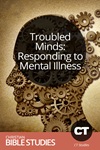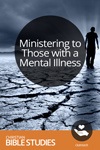A gentle touch woke me. I rubbed the sleep out of my eyes and saw my dad standing beside the bed.
"Sweetie," he said softly, "your Grandma Louden passed away this morning."
A door slammed in my mind. The hollow echo left me in a dark, hopeless place.
Eighteen years later, I see this watershed with new eyes. You know that old saying, "Hindsight is 20/20"? It must be true, because I now see that Grandma's sudden death triggered my first bout of major depression.
I've battled major depressive disorder, commonly known as clinical depression, for 18 years. I have periods of low mood that last for two weeks or longer. I used to become deeply depressed for four to ten months without relief. Then one day, I'd feel hopeful. I'd be well for three or four months, but when anything in my life changed, I'd plunge back into darkness.
Getting Help
It was a long journey before a physician wrote an 11-month prescription for an antidepressant. My eyes burned with tears of relief. I knew that I was going to get better. My doctor knew I was sick and needed long-term treatment.
Within minutes of taking the antidepressant, I started seeing colors more vividly than ever before. I spotted an emerald green shrub and took in the ice blue sky. I hadn't noticed anything but dull grayness in the weeks before.
In spite of that encouraging beginning, I didn't get better right away. It took six months to find the right medication and dosage. After treating my depression for two months, my OB/GYN flat-out told me she was not qualified to treat me. She urged me to see a psychologist.
But I didn't want to see a psychologist. Couldn't I just take a pill and get well? I numbed my depression for another month with alcohol, movies, and books. But I recognized that I was lashing out at my kids and that my drinking might put them in danger.
So I got out my insurance provider's manual and prayed over each of the psychiatrists' and psychologists' names. The psychologist I finally chose helped me hold on to sanity, even though I was taking the wrong antidepressant. Then it took three different doses before we figured out how much I needed to take, but we finally got it right.
Finding Hope
My husband recommended getting a part-time babysitter so I could write and let my mind rest. Writing, exercising, and driving while my children were at the sitter's helped me miss them and look forward to picking them up. I started believing I was getting better.
One day a friend called and asked if I would lead a women's Bible study. I prayed about it and then accepted the post. I believed I could lead a Bible study and handle the weekly teaching responsibility. I knew my kids would have fun playing in our church's nursery while I taught. I had found hope.
Despite the exhausting nature of depression, I now thank God for this disease. He has given me three ministries as a result of my depression. I now lead both an adult Sunday school class and a women's Bible study, and I write. God sustained me when no one else could.
I now cling to Psalm 139:7-8, 10: "Where can I go from your Spirit? … if I make my bed in the depths, you are there …. your right hand will hold me fast."
Practical Tips for Living with Depression
- Try writing in a journal. Get your toxic thoughts down on paper and out of your mind. And don't read what you've written.
- Try walking, bicycling, or swimming. Breathing deeply, getting some sun, and moving your body will relax your mind.
- Escape into novels. Stories change your mood.
- See a psychiatrist and/or a psychologist. They are trained to understand mental illness. They know exactly what you're describing and how to treat it. There's no shame in it. If you had heart disease, you'd see a cardiologist, right? See the doctors who can help you.
- Don't make major changes—don't move or change jobs, start dating, or get divorced.
- Read Jeremiah and Psalms. These men of God battled depression, and David was called a man after God's own heart. Read Isaiah 53, too. Here Jesus is called "a man of sorrows."
Is Your Loved One Depressed? These Are Tell-Tale Signs:
- Anxiety, irritability, mood swings, rage, and hopelessness.
- Changes in sleeping patterns. Are they sleeping too much? Not enough?
- Changes in eating habits. Are they overeating? Not eating enough?
Tips for Living with a Depressed Person
- Ask God to help you believe your loved one isn't lazy. He isn't selfish. She isn't trying to ruin everyone's happiness. He's sick. She can't just snap out of it.
- Ask God to help you understand that you can't reason or encourage yourself or anyone else out of chemical depression. Can you reason or encourage someone out of diabetes?
- Cling to the promise that Jesus won't leave you or your loved one. He promised, "Surely I am with you always, to the very end of the age" (Matt. 28:20).
Finding Hope in Depression
- Get help. See a psychologist and/or a psychiatrist. Jesus wants to see you get better so you can serve him. He made you for a specific purpose, and you can't serve him if you're so depressed you can't get off the couch.
- Hold on to the truth that depression isn't your fault. You've done nothing wrong. Believe that it isn't anyone else's fault, either. It's a disease, like cancer or diabetes.
- Ask God to open your mind to the possibility that he may be taking you through this isolation and misery so that you can help others who suffer as you do.
Copyright © 2012 by Christianity Today/ChristianBibleStudies.com. Click here for reprint information.












